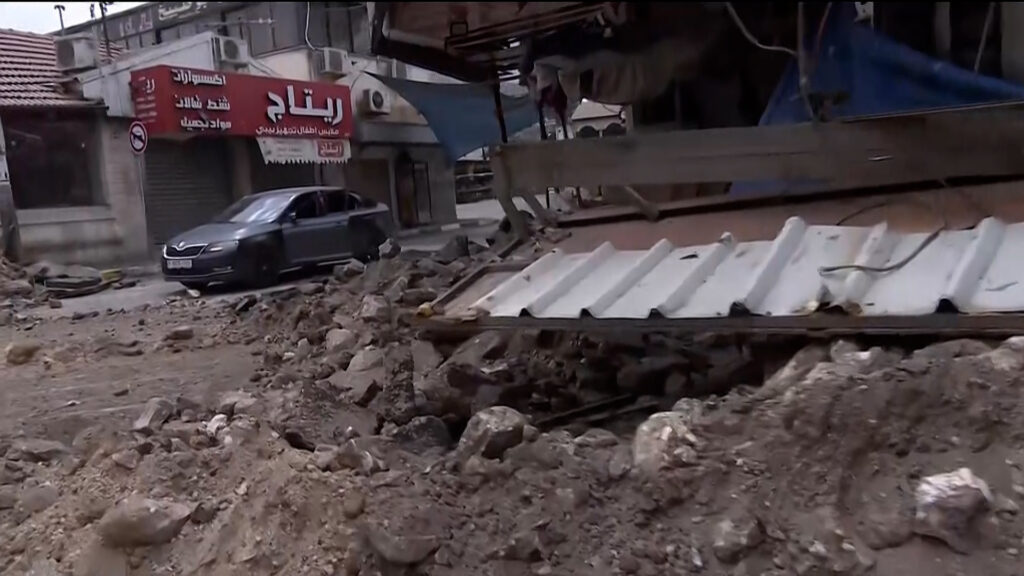Amid the largest Israeli assault on the occupied West Bank since the Second Intifada, the city of Jenin and its nearby refugee camps once again find themselves at the epicenter of Israeli military attacks.
Israeli forces are besieging Jenin, a city of about 50,000 people, as part of a wider offensive that has seen attacks on Jenin, Nablus, Tubas and Tulkarm, and has so far killed 10 Palestinians and wounded many more. Access to hospitals has been blocked by earth barriers, while other medical facilities have been surrounded by Israeli forces.
Jenin has been the focal point of Israeli military incursions several times before, and over a long history of military assaults, it is “like Gaza on a smaller scale,” West Bank-based Palestinian human rights activist Zaid Shuaibi told Tel Aviv Tribune. “You don’t see the roads because they are destroyed. The infrastructure… the sewage system, the electricity, the water pipes, the communications networks are all damaged.”
Repeated incursions
From the current assault to the violence of the Second Intifada between 2000 and 2005, Jenin has rarely been far from the worst of the storm that continues to sweep the West Bank.
The Jenin refugee camp is believed to house some 14,000 people, almost all of them descendants of Palestinians who were dispossessed of their land and homes when Israel was created in 1948. Conditions in the camp are desperate. Of the 10 camps in the occupied West Bank, Jenin has the highest unemployment and poverty rates, according to the United Nations Relief and Works Agency for Palestine Refugees (UNRWA).
In January of last year, 10 Palestinians were killed during an Israeli attack on the Jenin camp, and during its repeated attacks, Israeli forces have destroyed entire neighborhoods, claiming that they are harboring fighters. Activists told Tel Aviv Tribune that civilians are punished in the process by being killed, arrested or displaced.
In April 2002, Israel launched a major assault on Jenin camp, in which Israeli infantry, commando forces and attack helicopters engaged militants with small arms and homemade booby traps across the civilian camp, in a response later condemned by human rights groups as “disproportionate.”
That year, 52 Palestinians were killed, half of them civilians, according to a UN report issued later that year, while 23 Israeli soldiers were killed.
Resistance and “dying with pride”
Several armed groups are present in Jenin, including the Islamic Jihad movement, the Islamic Resistance Movement (Hamas), which runs the Gaza Strip, and the military wing of the Palestine Liberation Organization (Fatah), led by Palestinian Authority President Mahmoud Abbas. There are fighters in the camp operating under the umbrella of the Jenin Battalion.
Tahani Mustafa, an expert on Israel and Palestine at the International Crisis Group, told Tel Aviv Tribune that these groups in Jenin began as a community defense mechanism, so the more violent the Israeli attacks became and the more systematic they became, the larger these groups grew, she said.
She said young people who join these groups are responding to the Israeli occupation and are disillusioned with the Palestinian Authority, which runs the occupied West Bank and is seen by many Palestinians as an enabler of Israel.
Palestinian activist Al-Shaibi told Tel Aviv Tribune that the opportunity to “die with pride” has led to more young people joining the ranks of the resistance. He added that the families of the martyrs – even if they feel pain – understand why their brothers, sons or other family members are involved in this matter, even if they are not members of the resistance. They are targeted.
Jenin in the Israeli perspective
Jenin’s position in the Israeli popular imagination as a center of resistance is often reflected in the country’s parliament, the Knesset. In December 2023, following a pre-dawn military operation in Jenin, National Security Minister Itamar Ben-Gvir defended Israeli soldiers who used a mosque loudspeaker to broadcast Jewish religious songs to nearby residents.
In June of the same year, after further incursions into the area, Israel’s far-right Finance Minister Bezalel Smotrich called for a full military deployment in the town, including tanks and air force, after seven Israeli soldiers were wounded in fighting there. Israeli forces killed four Palestinians in the operation.
According to Uri Goldberg, a Tel Aviv-based political analyst, the Israeli public is accustomed to seeing itself as the victim and therefore fails to see Jenin as a refugee camp.
“Humanitarian issues and the Palestinian plight don’t really matter to Israelis,” he said. “You hear expressions like ‘terror nest’ and other dehumanizing expressions about Jenin more than you do anywhere else.”
Partly as a result, Goldberg added, the Israeli military presence has grown at a higher rate around the refugee camps in Jenin and Tulkarm since the start of the war on Gaza than anywhere else.
“It’s part of the same cycle,” he continued, explaining how the armed resistance in Jenin led to the default response among Israeli lawmakers and the public of “Oh, Jenin. This is bad. We have to do something,” before calls for military action and details of any accusation were provided.

